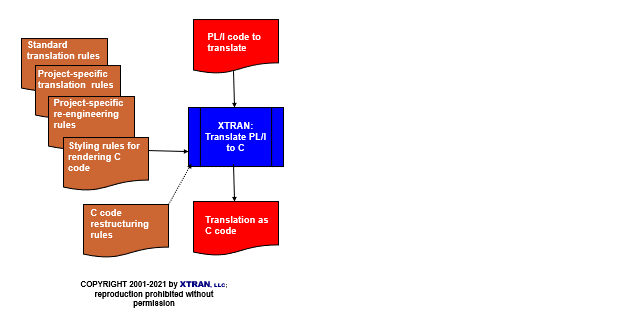XTRAN Example — Translate PL/I PROCEDURE Parameters/Arguments as "By Value"
PL/I normally passes arguments to PROCEDUREs "by
reference"; that is, what is passed is the address of the argument.
However, if a calling argument is a constant or an expression, PL/I passes it
"by copy": The PL/I compiler generates code to create a local
copy of the constant or expression value and passes the copy's address as the
argument.
When XTRAN translates PL/I to C/C++, it reflects this behavior: It normally generates code to pass an argument's address, but if the argument is a constant or expression, it generates code to declare a local copy and pass its address.
However, the chances are that if PL/I code passes a constant or expression
as an argument, then the called PROCEDURE doesn't modify the
corresponding parameter. Even if it does, it modifies only the copy whose
address was passed to it. Therefore, in the translated C/C++ we can
safely pass the parameter by value. In
fact, XTRAN extends the PL/I language by adding a new
declaration attribute, XTR_BYVAL, which
tells XTRAN to translate the
PROCEDURE parameter and all corresponding calling arguments as
"pass by value".
The knowledge of which PROCEDURE parameters actually have
matching arguments that are constants or expressions is scattered throughout
all of the PL/I modules to be translated.
XTRAN's powerful PL/I analysis capability
comes to the rescue.
Click ![]()
![]() for
an XTRAN analysis example that, using a set
of XTRAN rules ("meta-language"), examines all
arguments of all
for
an XTRAN analysis example that, using a set
of XTRAN rules ("meta-language"), examines all
arguments of all PROCEDURE calls in the code it is given, creates
a database of constant and expression argument occurrences, and reports those
occurrences.
After running that analysis on the code below; we used the resulting report
to modify the appropriate PROCEDURE parameter declarations, adding
XTR_BYVAL to them.
The following input to, and output from, XTRAN, is untouched.
Process Flowchart
Here is a flowchart for this process, in which the elements are color coded:
- BLUE for XTRAN versions (runnable programs)
- ORANGE for XTRAN rules (text files)
- RED for
code

Input to XTRAN:
DCL extprc1 ENTRY (FIXED (15) BIN XTR_BYVAL, FLOAT (5) BIN XTR_BYVAL,
FIXED (31) BIN) EXT;
DCL extprc2 ENTRY (CHAR (*) XTR_BYVAL, FIXED (31) DEC XTR_BYVAL,
FIXED (15) BIN) EXT;
% DCL (ppint1, ppint2) FIXED;
% ppint1 = 1;
% ppint2 = 2;
% DCL (ppchr1, ppchr2) CHAR;
% ppchr1 = '''abc''';
% ppchr2 = '''xy''';
% DCL ppexpr FIXED;
% ppexpr = ppint1 + 1;
prc: PROCEDURE;
DCL (int1, int2) FIXED (31) BIN;
DCL (flt1, flt2) FLOAT (5) DEC;
DCL (chr1, chr2) CHAR (5);
nstprc: PROCEDURE (arg1, arg2); /*nstprc: PROCEDURE...;*/
DCL arg1 FIXED (31) BIN XTR_BYVAL;
DCL (arg2, i) FIXED (31) BIN;
i = extprc1(1, 2.0, i); /*const args 1 & 2*/
END nstprc;
extprc1(int1, flt1, i); /*no const args*/
extprc1(1, flt1, int1); /*const arg 1*/
extprc1(int1 + 1, flt1, int1); /*expr arg 1*/
extprc1(ppexpr, flt1, int1); /*expr arg 1*/
extprc1(int1, 1.0, int1); /*const arg 2*/
extprc1(ppint1, flt2, int1); /*const arg 1*/
extprc2(chr1, int2, int1); /*no const args*/
extprc2('abc', int2, int1); /*const arg 1*/
extprc2(chr1, 2, int1); /*const arg 2*/
extprc2('a' | 'bc', 2, int1); /*expr arg 1, const arg 2*/
extprc2(ppchr1, chr2, int1); /*const arg 1*/
extprc2('abc', ppchr2, int1); /*const arg numbers 1,2*/
nstprc(int1, int2); /*no const args*/
nstprc(1, int2); /*const arg 1*/
end prc;
Output from XTRAN:
extern void extprc1(short, double, long *);
extern void extprc2(char [], long, short *);
#define PPINT1 1
#define PPINT2 2
#define PPCHR1 "abc"
#define PPCHR2 "xy"
#define PPEXPR (PPINT1 + 1)
static void nstprc(long arg1, long *arg2) /*nstprc: PROCEDURE...;*/
{
long i;
i = extprc1(1, 2., &i); /*const args 1 & 2*/
return;
}
void prc(void)
{
long int1, int2;
double flt1, flt2;
char chr1[5], chr2[5];
short i;
extprc1(int1, flt1, &i); /*no const args*/
extprc1(1, flt1, &int1); /*const arg 1*/
extprc1(int1 + 1, flt1, &int1); /*expr arg 1*/
extprc1(PPEXPR, flt1, &int1); /*expr arg 1*/
extprc1(int1, 1., &int1); /*const arg 2*/
extprc1(PPINT1, flt2, &int1); /*const arg 1*/
extprc2(chr1, int2, &int1); /*no const args*/
extprc2("abc", int2, &int1); /*const arg 1*/
extprc2(chr1, 2, &int1); /*const arg 2*/
extprc2("a" || "bc", 2, &int1); /*expr arg 1, const arg 2*/
extprc2(PPCHR1, chr2, &int1); /*const arg 1*/
extprc2("abc", PPCHR2, &int1); /*const arg numbers 1,2*/
nstprc(int1, &int2); /*no const args*/
nstprc(1, &int2); /*const arg 1*/
return;
}